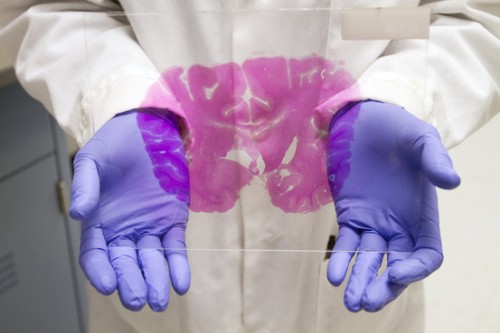You gotta hand it to the TSA, they’re really good at making you hate traveling. CNN has recently obtained a list of 70 “behavioral indicators” that the TSA uses to identify potentially high risk passengers and one of ’em is if you complain about the TSA. More
Digital Atlas Of The Human Brain
 Scientists at
Scientists at
The X-Men anime is fast-paced (and mildly ridiculous) mutant mayhem [Video]
Earlier this month, Madhouse’s X-Men anime miniseries debuted on Animax in Japan. We checked out the first three episodes and found that this show effectively balances high-octane mutant fighting with (cornball yet endearing) soap operatics. Cyclops is so emotional! More
How to Make Bacon Roses

Modern love is best expressed with bacon, but for the traditionalist, there are always bacon roses. Instructables user kaptaink_cg explains how to make them. You’ll need a broiling pan, a mini muffin pan, marbles, and a drill. It’ll be necessary to actually destroy the muffin pan, but it’ll be worth it.
Link via Geekosystem
Link:
How to Make Bacon Roses
How the Social Tech Bubble Is Different
theodp writes “Tech bubbles happen, writes BW's Ashlee Vance, but we usually gain from the innovation left behind. But this one — driven by social networking — could leave us empty-handed. Math whiz Jeff Hammerbacher provides a good case study. One year out of Harvard, 23-year-old Hammerbacher arrived at Facebook, was given the lofty title of research scientist and put to work analyzing how people used the social networking service. Over the next two years, Hammerbacher assembled a team that built a new class of analytical technology, one which translated insights into people's relationships, tendencies, and desires into precision advertising and higher sales. But something gnawed at him. Hammerbacher looked around Silicon Valley at companies like his own, Google, and Twitter, and saw his peers wasting their talents. 'The best minds of my generation are thinking about how to make people click ads,' he says. 'That sucks.' Silicon Valley historian Christophe Lecuyer agrees: 'It's clear that the new industry that is building around Internet advertising and these other services doesn't create that many jobs. The loss of manufacturing and design know-how is truly worrisome.'”
Read more of this story at Slashdot.
More here:
How the Social Tech Bubble Is Different
Medicines Lose Effectiveness In Space
An anonymous reader writes “Scientists at the Johnson Space Center have shown that the effectiveness of drugs declines more rapidly in space. Engineers are working on a project which could bring space travel to the general public but experiments suggest that the health hazards facing astronauts may be greater than previously thought. Astronauts on long space missions may not be able to take paracetamol to treat a headache or antibiotics to fight infection, a study has found. I wonder if diseases are also affected?”
Read more of this story at Slashdot.
Why we really can judge people on first impressions [Psychology]
There’s a very good reason why first impressions are thought to be so important: it’s because most people really can accurately judge another person after just one meeting. Turns out we’re much more perceptive than we give ourselves credit for. More
Gravity-defying Fiat 500 does a complete vertical loop [Video]
Is there a better way to advertise your increasingly expensive product while promoting the 2011 Autorai show than having British stuntman Steve Truglia do a complete 360 degree loop in a Fiat 500? Shell couldn’t think of one, which explains the video you see here. Even though the only English to be found in this video comes from the British stuntman, weird car stunts clearly transcend language barriers. More
A 9V Battery To Your Brain Can Improve Your Gaming
autospa writes with an intriguing story found at Nature about direct electrical stimulation’s effect on the brain. By applying low levels of electrical current to different parts of the brain via electrodes placed on the scalp, University of New Mexico researchers claim to have documented some significant changes in brain activity, which vary depending on the part of the brain targeted. Gamers, take note: in one experiment in which volunteers were recorded while playing a video war game, “those receiving 2 milliamps to the scalp (about one-five-hundredth the amount drawn by a 100-watt light bulb) showed twice as much improvement in the game after a short amount of training as those receiving one-twentieth the amount of current.” The idea of affecting the brain by electric stimulation isn’t new; but the battery-powered, non-invasive variety naturally leads some people to consider rolling their own.
Read more of this story at Slashdot.
Read this article:
A 9V Battery To Your Brain Can Improve Your Gaming
Train Barrels Through Outdoor Market, Clearing It By Inches
Some friends of mine went to Thailand years ago to do an urban study of a small regional airport. “What the hell does an airport have to do with urbanism?” you might ask.


